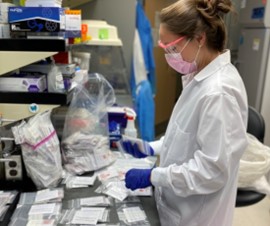Applied Epidemiology Concentration
Career Opportunities
Our Graduates Work As...

Epidemiologist

Project manager

Project coordinator

Data analyst

Researcher

Data scientist
Our Graduates Work With...

Federal, state, territorial and local health agencies

Global public health agencies

Nonprofit and health care organizations

Hospitals or health systems

The pharmaceutical industry
99% of Gillings graduates have a job or continue their education within one year of graduating.
Applied epidemiology has far-reaching implications for the field of public health. It can be used to:
- Define and prioritize public health practice and policy;
- Investigate and quickly respond to outbreaks, including identifying harmful pathogens or the factors contributing to disease;
- Build capacity for effectively implementing risk assessments and surveillance;
- Guide interventions to improve population health;
- Inform medicine and pharmacy (e.g., track toxicities; inform precision medicine based on genetics; evaluate drug efficacy);
- Evaluate programs and policies (e.g, HIV prevention among school girls in South Africa; bed nets to prevent malaria in infants); and
- Identify and study the determinants of disease (e.g., biological, behavioral, social, cultural, economic and political factors that directly or indirectly influence health).
Awards and Funding
Students fund their education through a combination of sources, including loans, fellowships and awards, assistantships and grants. Several awards and scholarships are supported by generous contributions to the School and University who value the current and future contributions of our students.
Contact: Sarah Kitchens, Funding and Awards Coordinator, sarah_kitchens@unc.edu
Looking for more flexibility?
Explore the online version of our Applied Epidemiology concentration by filling out the form below.


